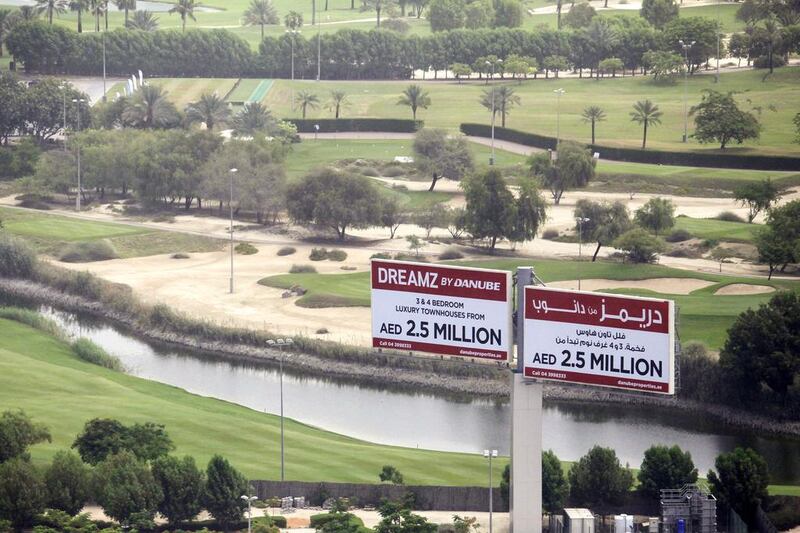Home prices in Dubai stayed flat in the third quarter from the previous period as the mortgage cap introduced late last year continued to check the volume of property transactions, according to Colliers International.
In the third quarter, property transactions were 6 per cent lower than in the previous quarter, data from the real estate services company showed.
As per the new rule which took effect in December last year, the loan to value ratio for buyers was set at 75 per cent for expatriates and 80 per cent for UAE nationals for property below Dh5 million. And for properties above Dh5m, the limit was dropped to 65 per cent and 70 per cent, respectively. Consequently, the Dubai Land Department too increased transfer fees.
Compared to the second quarter, there was slight decrease in apartment prices by 1 per cent last quarter to Dh1,567 per square feet from Dh1,584 square feet. Villa prices increased marginally during the same period to Dh1,480 per square feet from Dh1,474 per square feet. Townhouse prices increased by 2 per cent to Dh1,299 per square feet to Dh1,269 per square feet.
According to the second-quarter report from Colliers, apartment and townhouse values had increased 5 per cent from the first quarter of the year, while villa prices jumped 12 per cent in the same period.
Meanwhile, Colliers said in its latest report that on a year-on-year basis, the prices of apartments, villas and townhouses saw an increase of 14 per cent in the third quarter.
“While double digit growth in prices was witnessed in the residential sales market this year, our research indicates that the recent measures introduced by the government to curb the rate of growth are now in full effect,” said Ian Albert, the regional director of Colliers International in the Middle East and North Africa.
The jump in prices year-on-year were attributed to a strong GDP coupled with government spending on infrastructure, tourism and hospitality.
Among the popular neighbourhoods were Dubai Marina followed by Business Bay, Jumeirah Lake Towers, Downtown Dubai and Motor City.
The majority of the transactions were for apartments followed by villas.
Price of villas in The Palm Jumeirah saw the highest increase year on year of 38 per cent in the third quarter.
Apartment prices in Jumeirah Lakes Towers and Motor City recorded the second highest growth rates of 30 per cent year-on-year.
Meanwhile, rising rents in the second half of last year and first quarter of this year led many tenants to relocate to more affordable locations such as Jumeirah Village, Dubai Sports City, Remraam and Discovery Gardens.
“With over 50 per cent of Dubai households earning between Dh9,000 and Dh15,000 per month, and demand outstripping supply in this segment, we anticipate that investor appetite for mid-market properties will continue to drive high rates of return in this segment,” Mr Albert said.
Rents in Motor City, for example, rose 30 per cent year-on-year.
“Our advice is always to hold property over the medium to long term,” he said.
More residential units were expected to come in the current quarter, raising the number of units by 3 per cent from 431,300 at the end of last year. Of these, 44 per cent were expected to be freehold units.
Developers, however, have not slowed down. Cityscape Global in September in Dubai witnessed the launch of 27 projects from developers such as Meraas, Nakheel, Dubai Holding, Union Properties, Damac and Meydan Group worth billions of dirhams.
The new Indian government’s budget proposal in the summer on capital gains tax on overseas investments is expected to pare the appetite of Indian investors in Dubai’s real estate market. Indian buyers were involved in 4,400 transactions worth Dh10.5 billion in the first half of the year.
The falling rouble also means Russian buyers are finding it more expensive to buy in Dubai.
Colliers, however, feels that the decline in oil prices and the rouble are not expected to have any immediate effect.
“The market today is highly regulated through Rera, protecting individuals, banks and developers and ensuring that the overall market is better able to manage a downturn,” Mr Albert said.
The top five foreign investors by nationality during the first half were Indians, British, Pakistani, Iranian and Canadians, according to Dubai Land Department.
ssahoo@thenational.ae
Follow The National's Business section on Twitter






